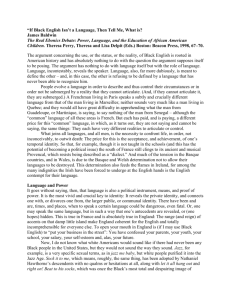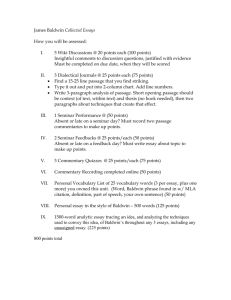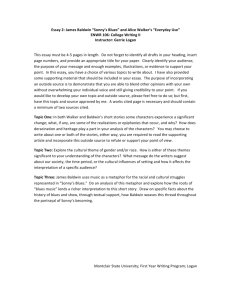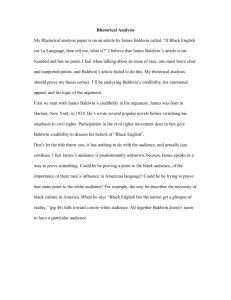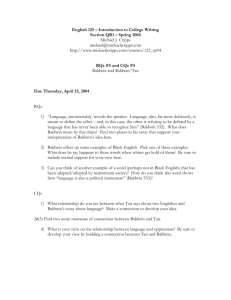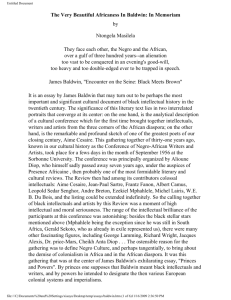Baldwin_on_black_eng..
advertisement
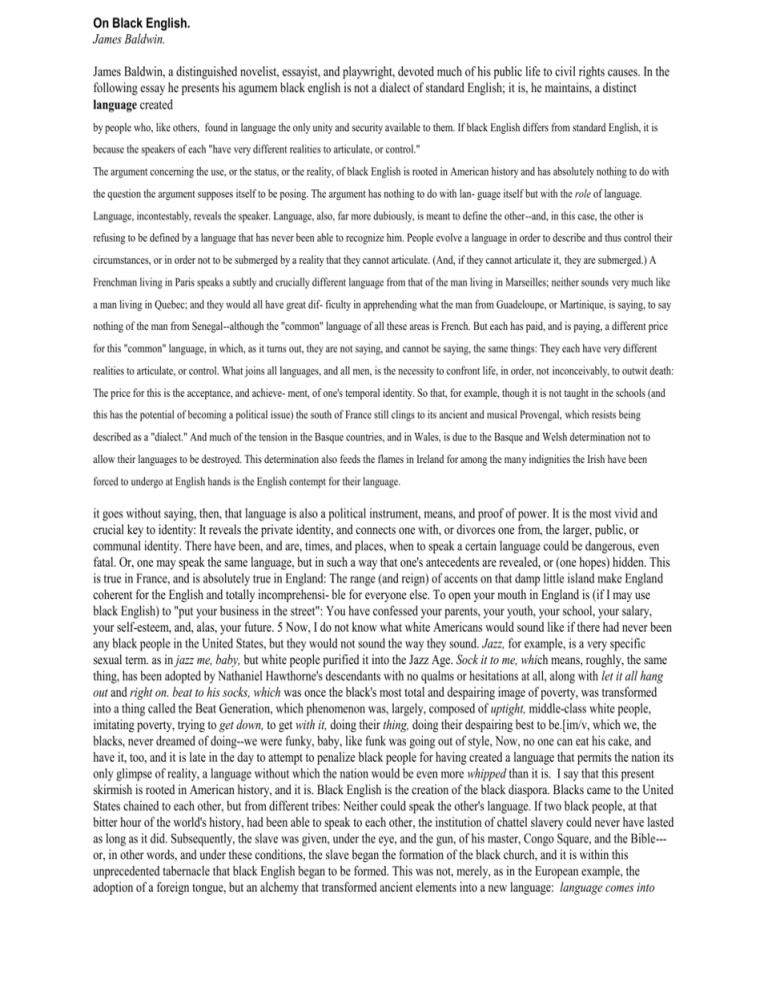
On Black English. James Baldwin. James Baldwin, a distinguished novelist, essayist, and playwright, devoted much of his public life to civil rights causes. In the following essay he presents his agumem black english is not a dialect of standard English; it is, he maintains, a distinct language created by people who, like others, found in language the only unity and security available to them. If black English differs from standard English, it is because the speakers of each "have very different realities to articulate, or control." The argument concerning the use, or the status, or the reality, of black English is rooted in American history and has absolutely nothing to do with the question the argument supposes itself to be posing. The argument has nothing to do with lan- guage itself but with the role of language. Language, incontestably, reveals the speaker. Language, also, far more dubiously, is meant to define the other--and, in this case, the other is refusing to be defined by a language that has never been able to recognize him. People evolve a language in order to describe and thus control their circumstances, or in order not to be submerged by a reality that they cannot articulate. (And, if they cannot articulate it, they are submerged.) A Frenchman living in Paris speaks a subtly and crucially different language from that of the man living in Marseilles; neither sounds very much like a man living in Quebec; and they would all have great dif- ficulty in apprehending what the man from Guadeloupe, or Martinique, is saying, to say nothing of the man from Senegal--although the "common" language of all these areas is French. But each has paid, and is paying, a different price for this "common" language, in which, as it turns out, they are not saying, and cannot be saying, the same things: They each have very different realities to articulate, or control. What joins all languages, and all men, is the necessity to confront life, in order, not inconceivably, to outwit death: The price for this is the acceptance, and achieve- ment, of one's temporal identity. So that, for example, though it is not taught in the schools (and this has the potential of becoming a political issue) the south of France still clings to its ancient and musical Provengal, which resists being described as a "dialect." And much of the tension in the Basque countries, and in Wales, is due to the Basque and Welsh determination not to allow their languages to be destroyed. This determination also feeds the flames in Ireland for among the many indignities the Irish have been forced to undergo at English hands is the English contempt for their language. it goes without saying, then, that language is also a political instrument, means, and proof of power. It is the most vivid and crucial key to identity: It reveals the private identity, and connects one with, or divorces one from, the larger, public, or communal identity. There have been, and are, times, and places, when to speak a certain language could be dangerous, even fatal. Or, one may speak the same language, but in such a way that one's antecedents are revealed, or (one hopes) hidden. This is true in France, and is absolutely true in England: The range (and reign) of accents on that damp little island make England coherent for the English and totally incomprehensi- ble for everyone else. To open your mouth in England is (if I may use black English) to "put your business in the street": You have confessed your parents, your youth, your school, your salary, your self-esteem, and, alas, your future. 5 Now, I do not know what white Americans would sound like if there had never been any black people in the United States, but they would not sound the way they sound. Jazz, for example, is a very specific sexual term. as in jazz me, baby, but white people purified it into the Jazz Age. Sock it to me, which means, roughly, the same thing, has been adopted by Nathaniel Hawthorne's descendants with no qualms or hesitations at all, along with let it all hang out and right on. beat to his socks, which was once the black's most total and despairing image of poverty, was transformed into a thing called the Beat Generation, which phenomenon was, largely, composed of uptight, middle-class white people, imitating poverty, trying to get down, to get with it, doing their thing, doing their despairing best to be.[im/v, which we, the blacks, never dreamed of doing--we were funky, baby, like funk was going out of style, Now, no one can eat his cake, and have it, too, and it is late in the day to attempt to penalize black people for having created a language that permits the nation its only glimpse of reality, a language without which the nation would be even more whipped than it is. I say that this present skirmish is rooted in American history, and it is. Black English is the creation of the black diaspora. Blacks came to the United States chained to each other, but from different tribes: Neither could speak the other's language. If two black people, at that bitter hour of the world's history, had been able to speak to each other, the institution of chattel slavery could never have lasted as long as it did. Subsequently, the slave was given, under the eye, and the gun, of his master, Congo Square, and the Bible--or, in other words, and under these conditions, the slave began the formation of the black church, and it is within this unprecedented tabernacle that black English began to be formed. This was not, merely, as in the European example, the adoption of a foreign tongue, but an alchemy that transformed ancient elements into a new language: language comes into existence by means of brutal necessity, ad the rules of the language are dictaled by what the language must convey. There was a moment, in time, and in this place, when my brother, or my mother, or my father, or my sister, had to convey to me, for example, the danger in which I was standing from the white man standing just behind me, and to convey this with a speed, and in a language, that the white man could not possibly understand, and that, indeed, he cannot understand, until today. He cannot afford to understand it. This understanding would reveal to him too much about himself, and smash that mirror before which he has been frozen for so long. Now, if this passion, this skill, this (to quote Toni Morrison) "sheer intelligence," this incredible music, the mighty achievement of having brought a people utterly unknown to, or despised by "history"--to have brought this people to their present, troubled, troubling, and unassailable and unanswerable place--if this absolutely unprecedented journey does not indicate that black English is a language, I am curious to know what definition of language is to be trusted. A people at the center of the Western world, and in the midst of so hostile a pop- ulation, has not endured and transcended by means of what is patronizingly called a "dialect." We, the blacks, are in trouble, certainly, but we are not doomed, and we are not inarticulate because we are not compelled to defend a morality that we know to be a lie. The brutal truth is that the bulk of the white people in America never had any interest in educating black people, except as this could serve white purposes. It is not the black child's language that is in question, it is not his language that is despised: It is his experience. A child cannot be taught by anyone who despises him, and a child cannot afford to be fooled. A child cannot be taught by anyone whose demand, essentially, is that the child repudiate his experience, and all that gives him sustenance, and enter a limbo in which he will no longer be black, and in which he knows that he can never become white. Black people have lost too many black children that way. And, alter all. finally, in a country with standards so untrustworthy, a country that makes heroes of so many criminal mediocrities, a country unable to face why so many of the non-white are in prison, or on the needle, or standing, futureless, in the streets--it may very well be that both the child, and his elder, have concluded that they have nothing whatever to learn from the people of a country that has managed to learn so little. Questions on Content. 1. Identify "the other" referred to in paragraph 1. Why is this reference intentionally vague? 2. Explain the origin of the term Beat Generation 3. According to Baldwin, what is the relationship between the black church and black English? In paragraph 8 the author asserts that white Americans "cannot afford to understand" black English. What does he mean'? 5. Why does Baldwin object to use of the term dialect to describe black English'? 6. Why, according to Baldwin, are black children unable to learn from most white educators'? Questions on Structure and Style. As you read paragraph 1, what tone and audience do you think Baldwin has in mind? Does your perception of either alter as you read the rest of the essay.'? Why does Baldwin bring up the varieties of French in paragraphs 2 and 3'? What effect does the author achieve by referring to white Americans as "Nathaniel Hawthorne's descendants" (para- graph 5)? Assignments. Baldwin asserts that language is "the most vivid and crucial key to identity" (paragraph 4). In an essay, explain what he means, agree or disagree with his position, and provide examples that support your position. The author states, "Black English is the creation of the black diaspora" (paragraph 7). What does he mean'? Write a few paragraphs in which you hypothesize whether a similar statement would be true of any of the other minorities in the United States. The author states, "To open your mouth in England is (if I may use black English) to 'put your business in the street'" (paragraph 4). In an essay based on your own experience and observation, discuss whether or not Americans "put their business in the street" when they speak.

